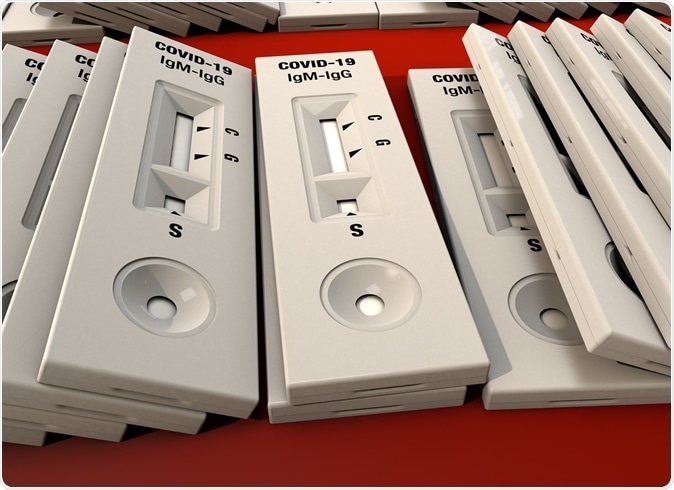Recently, several research groups emphasized how the pervasive screening for severe acute respiratory syndrome coronavirus 2 (SARS-CoV-2) antibodies may prove pivotal in determining infection seroprevalence in a given population defining previous exposure, screening health care workers, but also identifying highly reactive individuals that may act as donors for the therapeutic use of their convalescent serum.

The Promise and Peril of Antibody Testing for COVID-19. Jennifer Abbasi @ JAMA. Image Credit: Angel Soler Gollonet / Shutterstock
SARS-CoV-2 has recently emerged to cause the biggest pandemic threat of our time. The disease it causes, known as coronavirus disease 2019 (COVID-19), is a respiratory condition with a substantial case fatality rate. Although molecular diagnostic approaches were rapidly developed, serologic tests are still lacking – but are now urgently needed.
Unlike polymerase chain reaction (PCR) methods, which are molecular or nucleic acid-based tests, antibody detection does not strive to identify active infection with SARS-CoV-2 in the throat or nasopharyngeal swabs. Instead, antibody tests show markers of our body's immune response, more specifically, the IgM and IgG antibodies, which are seen in the blood of infected individuals when symptoms may already be disappearing.
But their use is not only confined for confirming suspected cases after the fact, as they can also disclose who has been infected without any symptoms. Almost half of the individuals with SARS-CoV-2 infection may inadvertently spread the virus due to mild or lack of symptoms. Consequently, validated serologic assays (i.e., antibody tests) are essential for contact tracing, viral reservoir recognition, and epidemiological surveys. An article by Jennifer Abbasi, a senior staff writer at JAMA, looks at the promise and risks of antibody testing for COVID-19.
Towards the herd immunity
The development of serologic or antibody tests is currently on the rise, with an ever-increasing list of commercial kits and protocols from academic researchers. Some of them are pioneered at the Erasmus Medical Center in the Netherlands and the Icahn School of Medicine at Mount Sinai, New York, USA. These research groups state how these tests may prove critical in the weeks and months ahead of us, primarily for disease surveillance and burden estimation.
"I think it makes total sense that if immunity is increasing and we have, let's say, 50% of people immune against this, then we have a much less chance that the virus will spread", explains Professor Dr. Melanie Ott, a senior investigator at the Department of Medicine of the Gladstone Institute of Virology and Immunology in San Francisco. "At a certain point, we will be able to minimize that risk with potentially minimal additional measures that have to be taken", she adds.
Along those lines, many research groups in Germany, Italy, and Iceland are pursuing large-scale antibody testing endeavors. Also, Public Health England (evidence-based support for the National Health Service) recently devised plans for nation-wide serologic screening, after a rapid finger-prick test for home usage passes all necessary accuracy assessments.
Burning issues regarding serologic testing
But although commercial manufacturers are marketing rapid serology tests, claiming they have high sensitivity and specificity, we still haven't seen published data. Also, using those tests to test recently symptomatic individuals may yield negative results, as antibodies are usually produced twelve days following the symptom onset.
Recently, the U.S. Food and Drug Administration (FDA) guidance document on serologic testing emphasized that negative serology testing results do not adequately rule out SARS-CoV-2 infection; thus, follow-up testing with a molecular diagnostic tool has to be considered to rule out the infection.
On top of that, patients can be PCR-positive even after antibodies emerge. "The question is, is that live virus that we're detecting? Is it replicating? And is it transmissible? And I think that's still an unknown at this point", says Associate Professor and Microbiologist Dr. Elitza Theel, director of the Mayo Clinic Infectious Diseases Serology Laboratory in Rochester, Minnesota, USA.
Antibody status certificate as a permit to reenter the society
The use of tests in Mount Sinai and Mayo Clinic may be followed by an emergence of widespread antibody testing in the general public, and consequently, to a gradual reopening of the society. In a world profoundly changed by COVID-19, Germany already plans to provide "immunity certificates" to move its citizens out of lockdown gradually.
Nonetheless, reintroducing people to a society based solely on their antibody status presumes that past infection adequately protects against reinfection – something that is likely, but still not well defined. "How broad and how long and how effective this immune response is is still not clear," says Dr. Ott. In addition, a positive antibody test coupled with a negative PCR result may reduce the possibility of contagious people reentering society.
Eventually, a positive serologic result may be a sort of out-of-isolation permit, and all immune individuals could practically go back to work and their normal life, as they won't be a hazard to anyone else. They could also provide support for those most vulnerable to severe infection, potentially until the development of the vaccine, and also act as donors of their convalescent serum.
Sources:
Journal reference:
Abbasi, J. (2020). The Promise and Peril of Antibody Testing for COVID-19. JAMA. doi:10.1001/jama.2020.6170, https://jamanetwork.com/journals/jama/fullarticle/2764954